CARPENTERS: THE SINGLES, 1969-1973.
The saccharine pop of Carpenters may seem an odd choice, but I argue that the dark heart that beats beneath their orchestrated sheen is worthy of investigation - and your adoration.
CARPENTERS: THE SINGLES 1969-1973
A&M
1973
UNEASY LISTENING
Don’t be that person.
Stop it.
Open your ears and set your mind to “Receive”.
Forget irony; there is no sarcasm here.
Drop your preconceptions and the sheer majesty of Carpenters is undeniable.
Yes – they are easily dismissed as sickly sweet, indulgent, overly orchestrated middle-of-the-road pap.
I get it.
But really listen, and you will hear some of the most abundant and complex arrangements in popular musical history, topped by one of the richest and most harmonious voices this side of Dolly.
To realise that the occasionally nauseating optimism of Carpenters’ tone was hiding such awful, body dysmorphic and psychological darkness somehow makes them even more enthralling.
I don’t mean to suggest that the tragedy of Karen Carpenter is in any way a positive thing. I’m not merciless and I adore the woman, so few things make me sadder than her struggle with her own mental health, but to understand that contradictory depth is to understand the heart of the songs.
Equally, Richard’s debilitating Quaalude addiction towards the end of the 70s must have been devastating for the pair and their families, causing cancellations of tour dates and creating an air of general unreliability.
The cracks in the wholesome facade create an abyssal pitch that forces a soul-deep shot beyond the sheen of the huge production work and the smiling public face of 70s pop royalty.
Carpenters were truly gothic and despite my considerable dislike for compilations, The Singles 1969-1973 is a near-perfect LP.
It is full of incredible compositions and forms a great snapshot of the times.
Not the outwardly subversive snapshot of more credible artists - this is a snapshot of Aran jumpers and family Sunday mornings, friendly sibling rivalries and the smell of roast dinners.
It’s far more real than the Velvets, Ziggy or Mick and Keef.
Uniquely Californian in scope, but dingily suburban in its universal escapism.
And from We’ve Only Just Begun to (They Long To Be) Close To You, every song is entirely, soothingly, beautiful. With some incredible surprises along the way.
Although I just have done, I shouldn't called Carpenters pop.
That label suggests a disposability that the music just doesn't have. It's much more than that - timeless in every way - it's sustaining, permanent, reassuring and inspiring - all things that pop very rarely is - at least for me.
It’s only ‘pop’ because it was so popular - but it genuinely feels more subversive than that, even if that’s just through a nostalgic lens.
For every sickeningly optimistic Top of the World or Sing, there’s a song with a dark underbelly of nostalgic sadness, loneliness and tragedy; a For All We Know or a Yesterday Once More.
All I’m saying is there’s much more to The Carpenters than meets the eye.
Or ear.
Richard Carpenter was a wildly competent songwriter and if only 25% of the songs on this LP are his compositions, there was a real art in the selection of the songs he chose from other writers.
And WHAT writers - Lennon and McCartney, Leon Russell, Carole King and Burt Bacharach all have songs on here - amongst many more songwriting greats.
The real genius though, is that every one of them feels like a Carpenters original, such is the impact of Richard’s arrangements, orchestrations and power in the studio.
Not one of them sounds like a cover.
It’s also worth noting that the Richard Carpenter writing credit is on some of the absolute highlights of the album. To go toe-to-toe with such lyrical giants is an incredible feat itself - and worth noting - you can’t dismiss Carpenters as simply playing other people’s tunes.
Yes - they were the ultimate, smiling, get-along-great siblings, with blinding white teeth and perfectly starched collars - but behind that smell of rose soap, toothpaste and fresh underwear lies something more formidable and interesting.
Something worthy of probing and revisiting.
Something genuinely unrivaled, 50 years later.
Karen and Richard Carpenter were musical savants. Karen a uniquely gifted drummer and timeless (but initially reluctant) three octave contralto vocalist and Richard a multi-instrumentalist that started on piano and could master anything he touched - including the studio.
When Carpenters began performing, Karen sang all the songs while drumming, but over time, her drumming took second place to her astonishing voice and she eventually came out from behind the kit and took a more conventional role at the front of the stage, with only occasional flourishes and showcases on the drums.
It wasn’t a move she felt comfortable with, feeling far more secure hidden away behind the kit, but by 1973, she was almost full-time up front.
Interestingly, all the songs on Singles 1969-1973 would have been sung at the time by a drumming Karen. She always considered herself to be a drummer who sang, not the other way around.
Richard was the musical director, but the sensitivity of his harmony vocals shouldn’t be underestimated – he’s present on almost every song, backing his sister up and adding tiers of harmonic depth to her lines. It’s a key aspect of the Carpenters signature.
Their career as Carpenters ended when Karen died of heart failure, brought on by complications from anorexia on February 4th, 1983, after collapsing at her parents’ home in Downey California.
Such tragedy: a woman so talented, beautiful and creative – absolutely devastated by mental illness, insecurities and depression. Her death led to far deeper investigations – and ultimately, understanding - of mental illness, body dysmorphia and eating disorders.
The songs on The Singles 1969-1973 only form the hits from the first four years of their career. There was another decade of music to follow, and some of their biggest successes were yet to come, but this album, to me, has a purity to it that the studio LPs and other compilations don’t – even if they all individually include some other, truly outstanding songs.
SINGLES GOING STEADY: 1969-1973
The false start of We’ve Only Just Begun will amusingly catch you out - once the first line of Close To You has been sung - the instrumentation drifts into the yearning tones of one of Carpenters’ greatest songs of longing.
Karen’s voice melts into your subconscious as readily as aural chocolate in the sweaty palms of a toddling child.
The lyrics run from new romance optimism:
“We've only just begun to live
White lace and promises
A kiss for luck and we're on our way
We've only begun”
To the importance of space in an established relationship:
“And when the evening comes, we smile
So much of life ahead
We'll find a place where there's room to grow
And yes, we've just begun”
The composition moves and swells through emotive sadness to perky optimism.
In many ways, it’s THE classic Carpenters song. Written by Paul Williams and Roger Nichols – staff songwriters at A&M - it understands exactly what it is and what it’s trying to achieve.
Immaculate song-craft.
Perhaps their most famous song of hope and belief, Top of The World, follows.
Check your baggage at the door.
Yes - this one and Sing, which rolls in later, midway through Side Two, recall primary school music lessons for an entire generation of ‘70s kids - but stop and listen to the sheer romance of the message:
“Something in the wind has learned my name
And it's telling me that things are not the same
In the leaves on the trees, and the touch of the breeze
There's a pleasing sense of happiness for me”
It sums up the flurry of excitement that a new relationship can bring; where horizons are within reach and nothing is insurmountable.
Of course it’s not cool, but nevertheless, if anyone reading this hasn’t felt that giddiness and undiluted optimism, they are all the sadder for it. It’s one of the greatest feelings in life and the song represents that unconscious skipped step perfectly.
For Top Of The World to have become a traditional song - such is its familiarity - is a show of its timeless strength and it’s an opportunity for Richard’s harmonies to shine in baritone, especially towards the end of the song, with its moderate call and response elements.
Written by Richard, it’s absolutely made for singing along to on family car journeys.
Ticket to Ride comes next - it was their debut single and the rearrangement of tone, orchestration and point of view is considerable. Karen’s vocals are rich and veer a long way away from the original Lennon and McCartney buoyance - and turns them into lost yearning instead of carefree pop with a “plenty of fish in the sea” tone of disposability.
Where you get the impression that the mop-tops are consigning this missed opportunity to just another one lost to their trail of broken hearts, Karen will never find another love like the one that’s gone.
Her heart is broken; the boys are just gutted that they won’t get their leg-over tonight.
The increased sensitivity smacks you in the gut in a way that The Beatles’ delivery never could. It works so much more powerfully from a female perspective.
It’s not a favourite of mine, but its impact is undeniable. To launch a career with it - and its challenging reinterpretation - really set the bar high for what to expect from the siblings in the future.
Superstar is next. An ode to radio, the nostalgic adoration of rock stars and the bittersweet memories that hearing a familiar old tune can recall.
Originally a co-write that included Leon Russell, Richard Carpenter heard Bette Midler’s version on TV and bettered it.
In Karen’s hands, yet again, the pangs of loneliness, yearning and loss ring deep and true – enough to make the tale of a fantasising groupie feel like a real struggle with unrequited and distant love.
On top of that, it’s a tune to end all tunes; the composition drops away to give Karen’s vocal performance the space to shine on top of a bed of strings and gentle rim-shots.
The way those soft verses turn into a horn led chorus that picks up pace and impact always feels to me like compositional genius – and then it just drops back down again, like it was no big deal.
So ace.
Is Rainy Days and Mondays just as iconic?
Probably.
But get these for sad lyrics; it’s easy to sing along like it’s peppy and all about blue skies and bright eyes, but it’s really not:
“Talking to myself and feeling old
Sometimes I'd like to quit
Nothing ever seems to fit
Hanging around; nothing to do but frown
Rainy days and Mondays always get me downWhat I've got they used to call the blues
Nothing’s really wrong
Feeling like I don't belong
Walking around like some kind of lonely clown
Rainy days and Mondays always get me down”
It's another one written by the same A&M staff writers as We’ve Only Just Begun – and you can’t help wondering if it was the lyrics that appealed most to Karen’s melancholic nature. It’s well documented how lonely she became and how much she doubted herself. It adds increased resonance to the tone of the lyrics.
Goodbye To Love closes Side One and it’s another Richard Carpenter composition – complete with fuzz guitar solo – something he is on record talking about:
“I wanted two things that ordinarily don’t go together:
A melodic fuzz guitar solo.”
And that’s what the song delivers – twice.
A solo you can sing, but that also jumps from the mix like some reprobate has kicked the studio doors in, grabbed a Flying V, dropped to his knees and given it some, as the engineers stand agog and disgusted, but keep the tape rolling anyway.
Unwittingly, it created an archetype that can be heard in every power ballad for the next two decades, at least.
Our journey continues on Side Two, with another Richard song, once more recalling the halcyon days of radio; Yesterday Once More:
“When I was young, I'd listen to the radio
Waiting for my favourite songs
When they played I'd sing along
It made me smileThose were such happy times, and not so long ago
How I wondered where they'd gone
But they're back again, just like a long lost friend
All the songs I loved so well”
The simple piano and bass accompaniment of the beginning of the song grows to full orchestration as the chorus hits. And the accents that give Karen’s voice its punctuation are just a tiny element of the depth that comes from the tune.
It moves, reflects and sweeps like gentle tidal waters.
There’s so much more to the music in a few bars of a Carpenters song than there is in an entire LP of modern pop music. The difference is so enormous it feels disgraceful to lump them into the same genre category.
There’s a real theme of wistful nostalgia in these songs which I can’t help thinking was a reflection of how Karen and Richard’s lives had gone so stratospheric so quickly that they couldn’t help but yearn for the simplicity and predictability of childhood and being teenagers again. Nostalgia is comforting.
The irony is that the cosy existence that is conjured up was a long way away from the what both kids, but especially Karen, had experienced. Their childhood sounds controlled, competitive, and claustrophobic.
But that apple-pie image was just something created by A&M to sell records to a specific demographic – something that Richard, especially, resented:
“I got upset when this whole “squeaky clean” thing was tagged onto us.
I never thought about us standing for anything!
The critics took Close To You and said “That’s for the people that believe in the American Flag. That’s for the average middle-American person and their station wagon!”
Boom. We got tagged with that label”.
Fair enough – it must have added so many tiers to their professional frustrations if they were feeling misrepresented and misconstrued.
It’s Going To Take Some Time is next, and how about this for self analysis after a break up?
“It's going to take some time this time
No matter what I've planned
But like the young trees in the winter time
I'll learn how to bend
After all the tears we've spent
How could we make amends?
It's one more round for experience
And I'm on the road again
And it's going to take some time this time”
Sorry, but that’s not cheesy. It’s profound.
Yes – the confessional nature of it might be too much for some, but you have to wonder how many listeners in the 70s were trapped in domesticity and fantasised about breaking free, using Karen’s voice as inspiration to get things done.
I hope it was millions.
The admittedly shitty Sing is next – but although it’s nauseating in its own way, it strikes me that its message is fundamental to the writers here on Substack:
“Sing, sing a song
Make it simple to last
Your whole life long
Don't worry that it's not
Good enough for anyone
Else to hear
Just sing, sing a song”
Isn’t that what we all say about writing?
“Don’t worry about how it’s received, just write!”.
Admittedly, we don’t have choirs of children backing up the message, but perhaps we should.
Nausea is followed by genius. For All We Know is simply a beautiful love song.
“Let's take a lifetime to say
I knew you well
For only time will tell us so
And love may grow - for all we know”
It’s a late album highlight and more conventionally written than most of the other songs. It was used in the film Lovers and Other Strangers; a movie I don’t know.
But if it resonates like For All We Know, it’ll be a Triple A weepy.
So; tears are followed up by the dementia of Hurting Each Other. I always forget about this one. And it’s got the air of Burt Bacharach about it, even though it wasn’t written by him.
But even if it was an amazing imitation of that man’s songwriting genius, it would be a world away from the true greatness of his talent, which is conveyed in spades with Close To You, the album closer.
What is there to say about (They Long To Be) Close To You that hasn’t been said before?
Maybe nothing and maybe that’s just it - we love it so much because it has all been said before.
It’s a true cross-generational classic. It’s perfectly written. Sounds so simple but has so much formidable depth. Sentimental, but not slushy. Innocent, not world-weary.
A gracious love song for the ages.
How many times has it been played at a wedding or quoted, eye to eye between a pair of love-struck fools?
So many that it should be well-worn enough to be worn out entirely – and yet somehow it persists.
It’s elemental magnificence – and Karen’s voice… oh, that voice - make it an integral part of the modern American songbook.
Of course, if you don’t appreciate a soft touch, Carpenters will never touch your cold stone heart.
I’ll never budge that opinion and fair enough – we are all what we are - but for those who hide a chink of sentimentality in their emotional armour, Carpenters will expose it, opening it to the elements and the simple truths of nostalgia, romance and beauty.
I encourage all cynics to give them a go. Open your hearts and minds.
Dispel your preconceptions and really listen to the songs.
Immerse yourself in the arrangements and fall in love with Karen and her golden voice. It will add layers of sadness and meaning to the performances.
As her t-shirt says: Lead Sister.
She really was.
I wish she’d truly believed that.
Such effortless grace.
Ave, Smoochers!






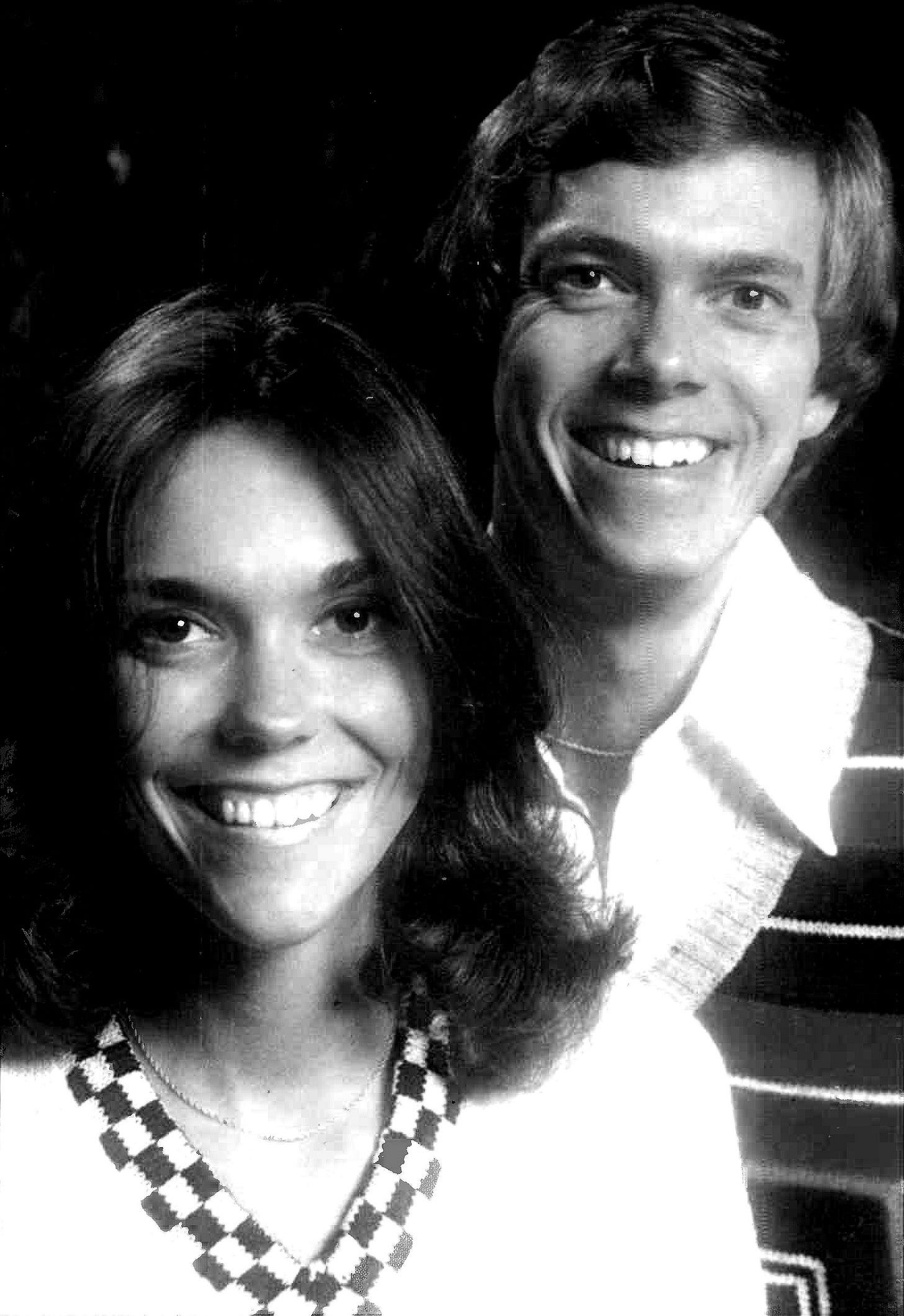
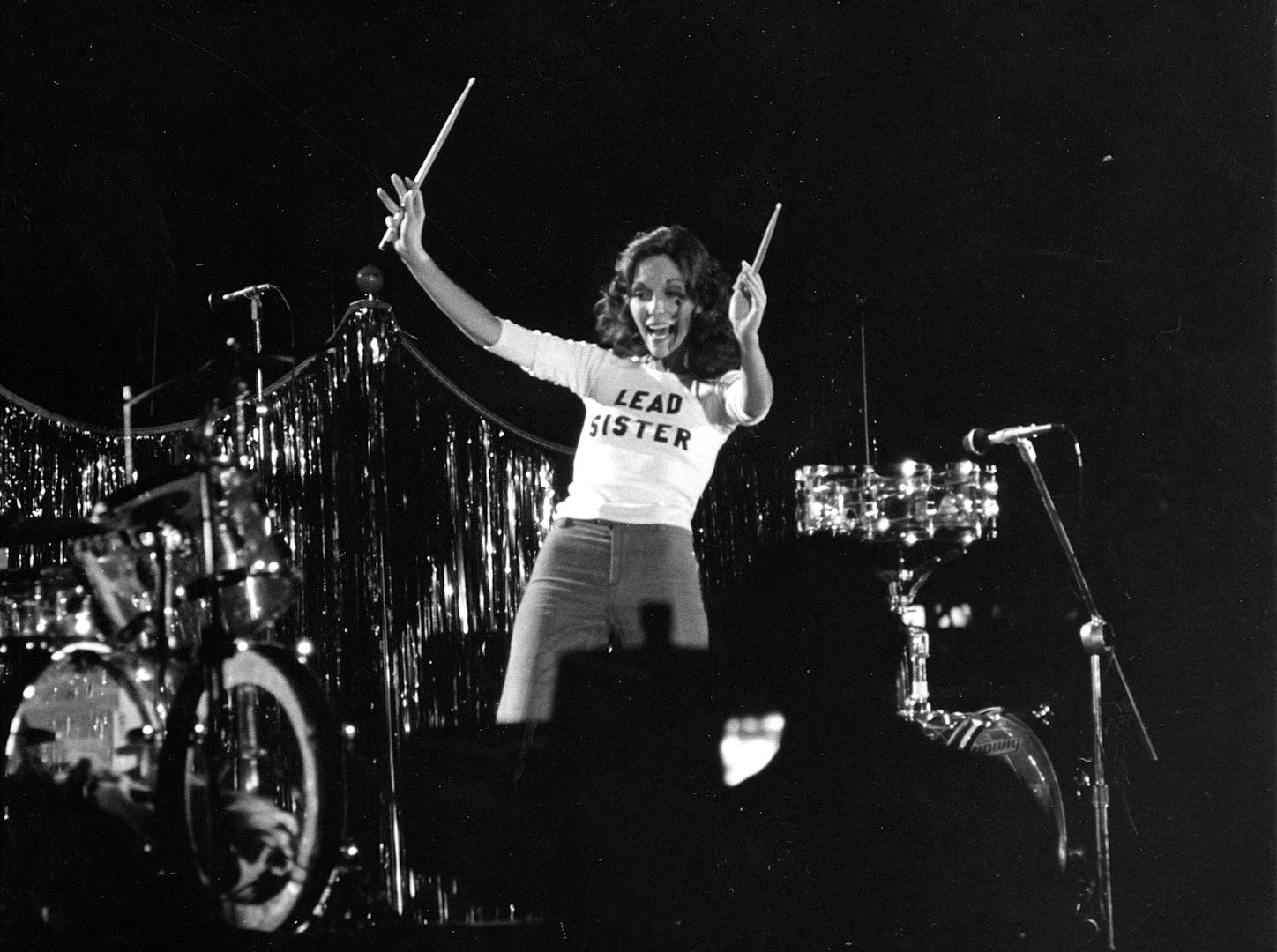
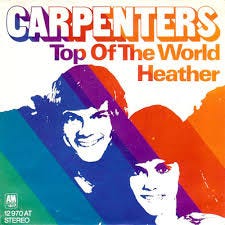
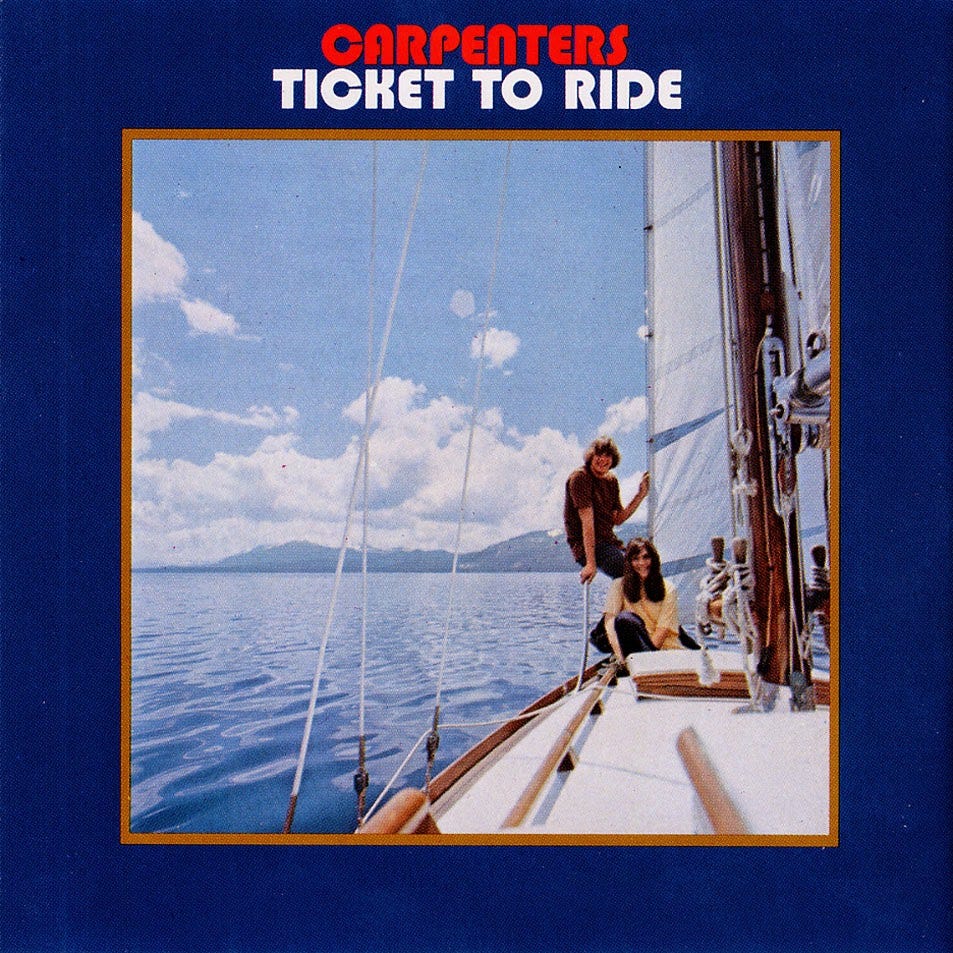
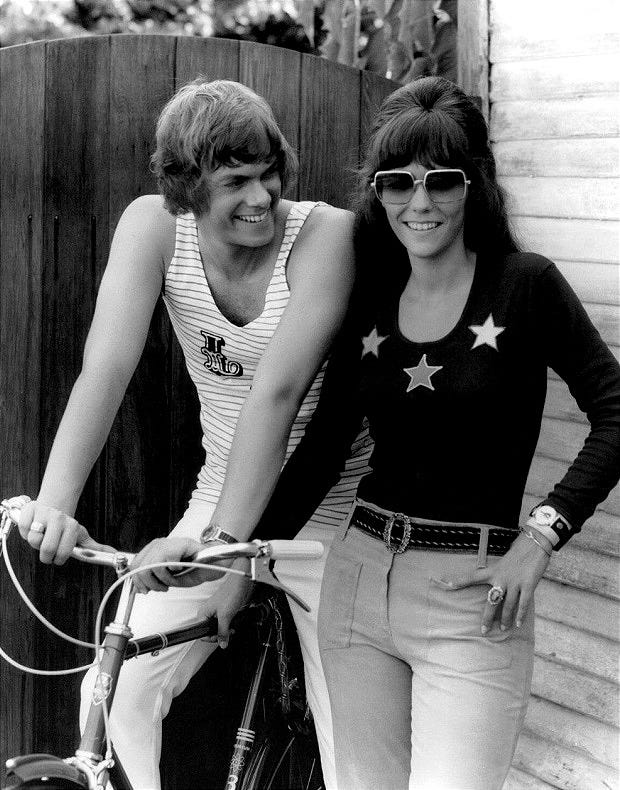
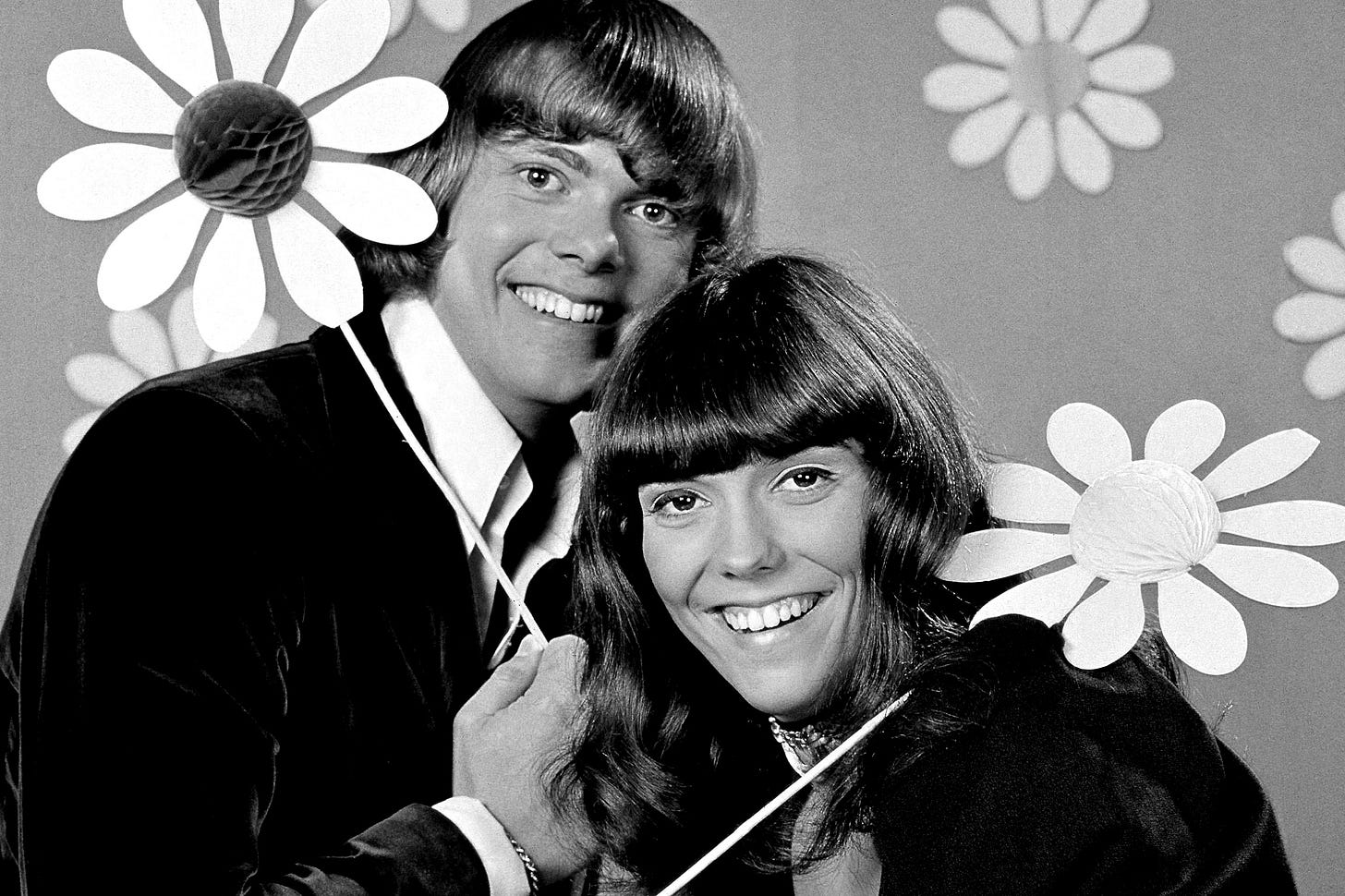


Brilliant stuff and I'm a big fan. Have you heard/seen the new Ting Tings stuff? Will look very familiar to you - seriously good too 👍